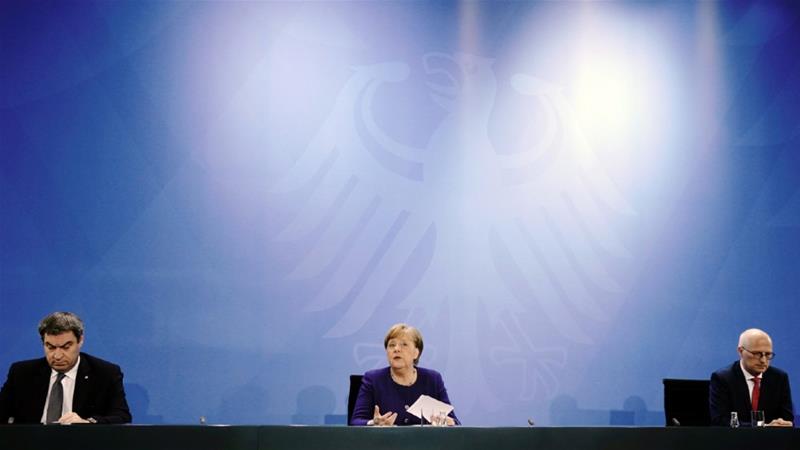Chancellor Angela Merkel with the leaders of Germany’s 16 states to agree on how to move to a wider reopening of society.
According to a leaked draft of the deal, shops, schools and Bundesliga football will all be part of an extensive plan to emerge from the coronavirus lockdown.
The states have reportedly agreed to take control of timing the reopening.
They will also have to react fast to any new surge in infections.
A limited resumption has already begun, but this would be far more widespread.
Germany has seen fewer than 7,000 deaths in the coronavirus pandemic – a much lower figure than seen in other Western European countries including the UK, Italy, France and Spain.
The RKI public health institute reported 165 deaths in the past 24 hours on Wednesday and some 947 new infections. Significantly the rate of infection has been consistently low for some time.
Schools have already begun opening for older children; the plan is now for all pupils to return to school gradually during the summer term.
During Wednesday’s talks, state leaders reportedly agreed to take responsibility for the consequences of lifting the lockdown, which came into force on 17 March.
Germany, in common with other countries, is wary of a second surge in infections.
If new infections rise to above 50 people in every 100,000 over a seven-day period, then in the affected areas the reopening has to be reversed, news agency DPA reports.
Shops of all sizes will also be allowed to reopen under the draft deal; restaurants, hotels and gyms too.
But as a number of the 16 states have been less affected by the crisis than others, some are more eager to reopen than others.
Bavaria in the south plans to reopen restaurants on 18 May while Mecklenburg-Western Pomerania in the north plans to do that this Saturday.
Reopening restaurants and hotels is seen as a particular risk because it will heighten the number of people travelling across Germany and raising infection rates.
A return to football?
The German football league, the Bundesliga is also likely to get the green light to resume.
So-called ghost games without spectators could start again as early as 15 or 21 May as long as a two-week quarantine is put in place for the players, in the form of a type of training camp.
It would be the first big European football league to resume after the pandemic.
However, it is not without risk. Ten positive cases were revealed this week by the German football league out of 1,724 tests across the top two divisions.
Not everyone has been happy with the speed of reopening.
Baden-Württemberg state premier Winfried Kretschmann accused “a whole row of colleagues of rushing ahead with their own openings”.
Meanwhile, tourism commissioner Thomas Bareiss has held out the hope that Germans will be able to go on holiday this summer.
If the outbreak remained under control, he suggested they could go away in Germany and in neighbouring countries that had seen a similar drop in infections.

